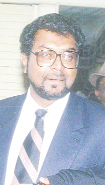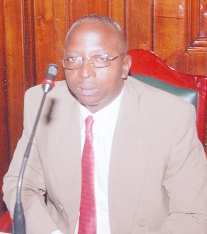– Ramjattan, Franklin
The conclusion of the trials of two key figures in Roger Khan’s operations ups the ante for an independent probe of the drug trafficker’s activities here, according to opposition MPs who say the government’s actions will test its sincerity in seeking assistance from the US.

Last Friday, ex-army major David Clarke and former Khan lawyer Robert Simels, both indicted in the US on separate charges stemming from their involvement with Khan, were sentenced. Clarke is now free, his sentence having matched the three years he had already spent in custody on cocaine importation charges. Simels was sentenced to 14 years in prison on witness tampering charges.
Although a special investigative unit has been set up to enquire into the alleged murders which surfaced during Khan’s trial, according to AFC MP Khemraj Ramjattan, the “allocution” by Clarke and Simels reiterates the need for an independent investigation into the government’s alleged relationship with narco-traffickers like Khan. He referred directly to Simels, noting that he had accepted liability, and pointed to the allegations of Khan’s links to Health Minister Dr Leslie Ramsammy and the government’s link to UK-based company Smith-Myers, which sourced intercept equipment used in illegal surveillance here.
Simels and his assistant, who were working for Khan, were caught on tape plotting to silence  witnesses against him. Simels’ trial saw explosive testimony from witnesses, including a professed member of Khan’s “Phantom Squad”, Selwyn Vaughn, who tied the government to Khan’s activities, including ordering the murder of activist Ronald Waddell and others. Testimony implicated Ramsammy as being knowledgeable of these matters and he was also identified as the government official who met Khan and facilitated the purchase of the spy equipment. Ramsammy and the government have denied the allegations and the minister has dared his accusers to prove otherwise.
witnesses against him. Simels’ trial saw explosive testimony from witnesses, including a professed member of Khan’s “Phantom Squad”, Selwyn Vaughn, who tied the government to Khan’s activities, including ordering the murder of activist Ronald Waddell and others. Testimony implicated Ramsammy as being knowledgeable of these matters and he was also identified as the government official who met Khan and facilitated the purchase of the spy equipment. Ramsammy and the government have denied the allegations and the minister has dared his accusers to prove otherwise.
Khan pleaded guilty earlier to charges that he conspired to import cocaine into the US over a five-year period, from January 2001 to March 2006. The US government had said he was the leader of a cocaine trafficking organisation based in Georgetown and that he was able to import huge amounts of cocaine into Guyana, and then oversee exportation to the US and elsewhere.
Ramjattan noted that the sentencing brought closure to the case in the US, and an investigation would bring similar closure here. At the same time, he was sceptical about government’s sincerity in pursuing intelligence from the US, pointing to the situation that led to the lapse of the Mutual Assistance in Criminal Matters law, which had to be re-enacted after President Bharrat Jagdeo failed to give his assent to it three and a half years ago. Presidential Advisor on Governance Gail Teixeira told the National Assembly that the government was now in a better position to implement the law, which would provide the legal framework for requests for information with other governments. Ramjattan asserted that the government wants nothing to do with intelligence gathering and while he said the law might receive the President’s assent, he did not expect it to be operationalised as it could expose the government’s complicity. “That is what they want to hide,” he added.
In this regard, Ramjattan emphasised that the only solution for the citizenry now appears to be to vote the PPP/C administration out of office, exchanging a “sleight of hand government” for real change.
GAP-ROAR MP Everall Franklin thinks that with the end of the trials, people expect the government to seek a full disclosure about the period during which Khan’s activities were carried out — which he said should have been done since the inception. “The problem is that it is undoubtable that people within the government would be implicated and people within the security forces and they are in a dilemma,” Franklin declared, adding, “They should have been seeking clarification on a number of issues but the problem remains — who will bell the cat?” He added that the suspected complicity of senior officials in the government and the security forces occasioned the call by the joint opposition parliamentary parties for an independent commission of inquiry to investigate the entire period. He said if the government is also interested in investigating an earlier period, it could do so as well. But he stressed that it is the most recent events that require an expeditious examination. “That chapter has only just begun to be written,” he said, “the pile of bodies is too high to be swept under the carpet.”
Franklin said Clarke’s saga is important as far as it points to a link between Khan and the government. Clarke was at one time head of Operation Tourniquet in Buxton, an unsuccessful post-2002 jailbreak operation that had been aimed at quelling the crime wave. Instead, it had been alleged that Clarke was actively working with the criminals and also with Khan to traffic in cocaine. By 2003, Clarke found himself persona non grata as President Bharrat Jagdeo blocked his promotion for a year and ordered that he return home from an overseas training stint.
According to Franklin, it was only after Clarke and Khan apparently fell out that he became a “bad man” and his promotion was blocked. “It is obvious that high officials knew of the falling out,” he said, noting that the information was not privy to anyone who did not have communication with Khan. He believes it was for this reason that the Defence Board blocked Clarke’s promotion.
Clarke had been publicly accused by President Jagdeo of being in cahoots with the Buxton criminals while he was stationed there as head of Tourniquet — an accusation that also came from Khan. Following a report in this newspaper about Clarke being in a US jail on drug trafficking charges, Jagdeo revealed that he had received “confidential information” from Buxtonians that the Guyana Defence Force (GDF) officer was working with criminals. He said he could not order a court-martial as Commander-in-Chief of the armed forces since he wanted to protect the identities of the informers.
Franklin, like Ramjattan, was skeptical about redress, pointing out that the law and justice are not necessarily compatible in Guyana. “This is frustrating for the people who see there is no level playing field,” he explained, adding that it was obvious that those with money can get away with anything.
Clarke surrendered to US authorities early in 2006. He was charged along with his brother, Hubert Clarke called ‘Dun Dun,’ and his brother’s girlfriend Shelly McQune, who are still at large. At the time Clarke was ensnared in the activities that led to the US charges, he was also the army man in charge of a key security operation in Buxton.
Stabroek News has been reliably informed that when he learnt of his indictment in April 2006, he immediately contacted the US Embassy in Guyana. Sources have also indicated that upper echelons of the army had also received a copy of his indictment but kept it under wraps and Clarke was allowed to voluntarily leave the country and travel to the US where he surrendered.
